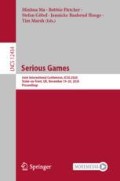Abstract
A main challenge for teachers is to provide good educational offers that appear both appealing as well as motivating to students to learn about the content according to the curriculum. Educational games are thought to be a good complementary way of provide this learning environment, but, so far, the adaption of educational games to a specific context is not only costly but also requiring a lot of knowledge related to game design. This article provides some examples on how gamified lessons paths can be changed in a simple way and how different components can be re-used, in order to save costs and time and to improve the overall quality of the learning experience.
Access this chapter
Tax calculation will be finalised at checkout
Purchases are for personal use only
References
Iten, N., Petko, D.: Learning with serious games: is fun playing the game a predictor of learning success? Br. J. Educ. Technol. 47(1), 151–163 (2016)
Giessen, H.W.: Serious games effects: an overview. Procedia - Soc. Behav. Sci. 174, 2240–2244 (2015). https://doi.org/10.1016/j.sbspro.2015.01.881. ISSN 1877-0428
Mouaheb, H., Fahli, A., Moussetad, M., Eljamali, S.: The serious game: what educational benefits? Procedia - Soc. Behav. Sci. 46, 5502–5508 (2012). https://doi.org/10.1016/j.sbspro.2012.06.465. ISSN 1877-0428
Mayer, I.: Towards a comprehensive methodology for the research and evaluation of serious games. Procedia Comput. Sci. 15, 233–247 (2012). https://doi.org/10.1016/j.procs.2012.10.075. ISSN 1877-0509
Khenissi, M.A., Essalmi, F., Jemni, M.: Comparison between serious games and learning version of existing games. Procedia - Soc. Behav. Sci. 191, 487–494 (2015). https://doi.org/10.1016/j.sbspro.2015.04.380. ISSN 1877-0428
Paiva, A.C.R., Flores, N.H., Barbosa, A.G., Ribeiro, T.P.B.: iLearnTest – framework for educational games. Procedia - Soc. Behav. Sci. 228, 443–448 (2016). https://doi.org/10.1016/j.sbspro.2016.07.068. ISSN 1877-0428
Carvalho, M.B., et al.: An activity theory-based model for serious games analysis and conceptual design. Comput. Educ. 87, 166–181 (2015). https://doi.org/10.1016/j.compedu.2015.03.023. ISSN 0360-1315
Buchinger, D., da Silva Hounsell, M.: Guidelines for designing and using collaborative-competitive serious games. Comput. Educ. 118, 133–149 (2018). https://doi.org/10.1016/j.compedu.2017.11.007. ISSN 0360-1315
Baalsrud Hauge, J.M., Stefan, I.A., Stefan, A.: Exploring pervasive entertainment games to construct learning paths. In: Munekata, N., Kunita, I., Hoshino, J. (eds.) ICEC 2017. LNCS, vol. 10507, pp. 196–201. Springer, Cham (2017). https://doi.org/10.1007/978-3-319-66715-7_21
BEACONING Project: D3.3 learning environment system specification (2017)
Bell, B.: Investigate and decide learning environments: specializing task models for authoring tool design. J. Learn. Sci. 7(1), 65–105 (1998). https://doi.org/10.1207/s15327809jls0701_3
Wiley, D.A.: Connecting learning objects to instructional design theory: a definition, a metaphor, and a taxonomy. Instr. Use Learn. Objects 2830(435), 1–35 (2000)
Martinez, M.: Designing learning objects to personalize learning margaret martinez. Instr. Use Learn. Objects 2830(435), 151–172 (2000). in Wiley, D.A.
Stănescu, I.A., et al.: Strategies and tools to enable reuse in serious games ecosystems and beyond. In: Proceedings of the 10th International Scientific Conference, eLearning and Software for Education (2014)
Stanescu, I.A., Baalsrud Hauge, J., Stefan, A., Lim, T.: Towards modding and reengineering digital games for education. In: de De Gloria, A., Veltkamp, R. (eds.) GALA 2015. LNCS, vol. 9599, pp. 550–559. Springer, Cham (2016). https://doi.org/10.1007/978-3-319-40216-1_59
Baalsrud Hauge, J., et al.: Serious game mechanics and opportunities for reuse. In: Roceanu, I. (ed.) Rethink Education by Leveraging the eLearning Pillar of the Digital Agenda for Europe, Proceedings of the 11th International Conference on eLearning and Software for Education (eLSE), Bucharest/Romania, vol. 2, pp. 19–27. Carol I NDU Publishing House, Bucharest (2015)
Stanescu, I.A., Stanescu, A.M., Moisescu, M., Sacala, I.S., Stefan, A.: Enabling interoperability between serious game and virtual engineering ecosystems. In: Proceedings of the ASME 2014 International Design and Engineering Technical Conferences & Computers and Information in Engineering Conference (IDETC/CIE2014), Buffalo, New York, USA (2014)
BEACONING Project: D6.3 validation and usability report (2019)
Lim, T., et al.: The LM-GM framework for serious games analysis (2013). https://pdfs.semanticscholar.org/7df0/20237a6d3995860e7345c77dab28e4d0a001.pdf?_ga=2.140232560.2103361417.1593945229-977332475.1569848762. Accessed 04 July 2020
Baalsrud Hauge, J., et al.: Exploring context-aware activities to enhance the learning experience. In: Dias, J., Santos, P.A., Veltkamp, R.C. (eds.) GALA 2017. LNCS, vol. 10653, pp. 238–247. Springer, Cham (2017). https://doi.org/10.1007/978-3-319-71940-5_22
Lim, T., et al.: Narrative serious game mechanics (NSGM) – insights into the narrative-pedagogical mechanism. In: Göbel, S., Wiemeyer, J. (eds.) GameDays 2014. LNCS, vol. 8395, pp. 23–34. Springer, Cham (2014). https://doi.org/10.1007/978-3-319-05972-3_4
Author information
Authors and Affiliations
Corresponding author
Editor information
Editors and Affiliations
Rights and permissions
Copyright information
© 2020 Springer Nature Switzerland AG
About this paper
Cite this paper
Baalsrud Hauge, J., Stefan, I. (2020). Improving Learning Outcome by Re-using and Modifying Gamified Lessons Paths. In: Ma, M., Fletcher, B., Göbel, S., Baalsrud Hauge, J., Marsh, T. (eds) Serious Games. JCSG 2020. Lecture Notes in Computer Science(), vol 12434. Springer, Cham. https://doi.org/10.1007/978-3-030-61814-8_12
Download citation
DOI: https://doi.org/10.1007/978-3-030-61814-8_12
Published:
Publisher Name: Springer, Cham
Print ISBN: 978-3-030-61813-1
Online ISBN: 978-3-030-61814-8
eBook Packages: Computer ScienceComputer Science (R0)

